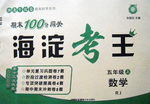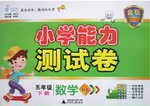
We considered him to be a true friend, ______did many others whom he had cheated
A. which B. as C. when D. though
 期末100分闯关海淀考王系列答案
期末100分闯关海淀考王系列答案 小学能力测试卷系列答案
小学能力测试卷系列答案科目:高中英语 来源: 题型:阅读理解
People do not analyze every problem they meet. Sometimes they try to remember a solution from the last time they had a similar problem. They often accept the opinions or ideas of other people. Other times they begin to act without thinking. They try to find a solution by trial and error. However, when all these methods fail, the person with a problem has to start analyzing. There are six stages in analyzing a problem.
First the person must recognize that there is a problem. For example, Sam’s bicycle is broken, and he cannot read it to class as he usually does. Sam must see that there is a problem with his bicycle.
Next the thinker must define the problem. Before Sam can repair his bicycle, he must find out the reason why it does not work. For instance, he must determine if the problem is with the gears, the brakes, or the frame. He must make his problem more specific.
Now the person must look for information that will make the problem clearer and lead to possible solutions. For instance, suppose Sam decided that his bike does not work because there is something wrong with the gear wheels. At this time, he can look in his bicycle repair book and read about gears. He can talk to his friends at the bike shop. He can look at his gears carefully.
After studying the problem, the person should have several suggestions for a possible solution. Take Sam as an illustration. His suggestions might be: put oil on the gear wheels; buy new gear wheels and replace the old ones; tighten or loosen the gear wheels.
Eventually one suggestion seems to be the solution to the problem. Sometimes the final idea comes very suddenly because the thinker suddenly sees something new or sees something in a new way. Sam, for example, suddenly sees that there is a piece of chewing gum between the gear wheels. He immediately realizes the solution to his problem: he must clean the gear wheels.
Finally the solution is tested. Sam cleans the gear wheels and finds that afterwards his bicycle works perfectly. In short , he has solved the problem.
36.What is the best title for this passage?
A. Six Stages for Repairing Sam’s Bicycle B. Possible Ways to Problem-solving
C. Necessities of Problem Analysis D. Suggestions for Analyzing a Problem
37. In analyzing a problem we should do all the following except .
A. recognize and define the problem B. look for information to make the problem clearer
C. have suggestions for a possible solution
D. find a solution by trial or mistake
38. By referring to Sam’s broken bicycle, the author intends to _________.
A. illustrate the ways to repair his bicycle
B. discuss the problems of his bicycle
C. tell us how to solve a problem
D. show us how to analyze a problem
39. Which of the following is NOT true?
A. People do not analyze the problem they meet.
B. People often accept the opinions or ideas of other people.
C. People may learn from their past experience.
D. People can not solve some problems they meet.
40. As used in the last sentence, the phrase “in short” means _________.
A. in the long run B. in detail C. in a word D. in the end
查看答案和解析>>
科目:高中英语 来源: 题型:阅读理解
Both warm-blooded and cold-blooded desert animals have ways to escape the desert heat. Warm-blooded desert animals, such as rats and mice, rest during the day, often staying in cool underground burrows. At night they search for food. Animals that are out during the day, such as cold-blooded lizards and snakes, are active only for short periods. As their body temperature rises, these reptiles move into the shade in order to cool down. In the early evening, when the sun grows weaker, the reptiles become more active and begin their search for food again.
Getting enough water to survive is a major problem for all desert animals. Some desert animals, such as the kangaroo rat and the related jerboa, get water only from the food that they eat. Because these animals eat mainly dry seeds, they must survive on a tiny amount of water.
Most deserts have only a small number of frogs and toads because these animals must be near water to survive. Yet even these creatures have adapted to desert conditions. When small amounts of water collect in temporary streams, the desert-living frogs and toads become active. After a rainfall, they lay their eggs. The eggs grow into tadpoles in a few days and into adults in just four weeks. When the puddles dry up, the adult frogs or toads dig into the ground. Their metabolism(新陈代谢) slows, and they stay beneath the ground until the next rain, which may be as good as a year away. Until then, their bodily activities continue at a reduced rate.
The camel---often called the ship of the desert---is one of the most successful desert animals. Camels can go for long periods without water, but eventually they must drink. When water becomes available to them after a long drought, they may drink 95 liters of water or more. When water is not available, what helps camels survive the desert heat is the fat stored in their humps. A camel’s hump contains about 12 kilograms of fat. Fat is rich in hydrogen. As the fat is digested, hydrogen from the fat combines with oxygen in the air that the camel breathes. The result is H2O, or water. Each kilogram of fat that a camel digests produces about a liter of water.
71. Desert animals are usually more active at night because ______.
A. it is cooler at night B.it is easier to find water
C.they like the dark D. they are less likely to be attacked at night
72. Which of the following desert animals can get water only from the food?
A. The camel. B. The kangaroo rat. C. The frog. D. The toad
73. Which of the following is TRUE according to the passage?
A. All the desert animals rest during the day.
B. All the desert animals don’t rest during the day.
C. Cold-blooded desert animals don’t rest during the day.
D. None of the cold-blooded desert animals go out during the day.
74. The title for this passage could probably be ________.
A. Hot Deserts B. Desert Animals
C. How Desert Animals Get Water D. Ways To Escape the Desert Heat
75. The underlined word “burrows” in the first paragraph can be replaced by _________.
A. holes B. caves C. rooms D. openings
查看答案和解析>>
科目:高中英语 来源: 题型:
The evidence has ______ the first witness's story.
A. confused B. accumulate C. confirmed D. attached
查看答案和解析>>
科目:高中英语 来源: 题型:
A reward of 1,000 dollars will be given _______can find the lost child.
A.whomever B.whoever that C.to whomever D.to whoever
查看答案和解析>>
科目:高中英语 来源: 题型:
What shall we use for power when all the oil in the world has been _________?
A. given out B. put out C. held up D. used up
查看答案和解析>>
科目:高中英语 来源: 题型:
As a teacher you should your method to the needs of slower students.
A.apply; enable B.adjust; meet C.increase; change D.weigh; shape
查看答案和解析>>
科目:高中英语 来源: 题型:
We had ______ great fun watching the performance, which was ____ entire success.
A. a; an B, a; the C. /; an D. a; /
查看答案和解析>>
科目:高中英语 来源: 题型:阅读理解
SECTION B
Directions: For each blank in the following passage there are four words or phrases marked A, B, C and D. Fill in each blank with the word or phrase that best fits the context.
I remember my dad teaching me the power of language at a very young age. Not only did he understand that specific 36 can affect our mental pictures, but he understood that words are a 37 programming factor in lifelong success.
One particularly unforgettable event occurred when I was eight. As a child, I was always climbing trees, poles and 38 around upside down from the rafters(屋椽) of our lake house. 39 , it came to no surprise for my dad to find me at the top of a 30-foot tree, swinging back and forth. My little eight-year-old 40 didn’t realize that the tree could break or I could get hurt. I just thought it was enjoyable to be up so high. My older cousin, Tammy, was also hanging in the same tree. Her mother also 41 us at exactly the same time as my dad did. About that time, a huge gust(一阵) of wind blew through the tree. I could hear the leaves rustle(嘎嘎地响) and feel the tree begin to sway. I remember my dad’s 42 over the wind, “Bart, Hold on tightly!”So I did.
The next thing I heard was Tammy’s mother yelling, “Tammy, don’t fall!” Tammy did 43 . My dad later explained to me that the mind has a very 44 time processing a negative image. It takes seventeen positive statements to offset(抵消) one negative statement. That means it might 45 seventeen compliments(贺词/道贺) to offset the emotional 46 of one criticism.
These are concepts that are especially useful in developing yourself. How many compliments do you give yourself daily and how often do you criticize yourself? Try to 47 yourself a lifetime of positive programming by complimenting yourself, or at least think about the kind of programming you are doing to yourself on a daily basis. Remember: try to make positive self-talk a daily practice and you will succeed some day.
36. A. reactions B. behaviors C. words D. expressions
37. A. doubtful B. sensible C. strange D. powerful
38. A. sitting B. hanging C. standing D. lying
39. A. However B. Furthermore C. Moreover D. Therefore
40. A. brain B. memory C. experience D. knowledge
41. A. believed B. noticed C. protected D. persuaded
42. A. voice B. figure C. image D. anger
43. A. hold B. think C. fall D. regret
44. A. surprising B. relaxing C. difficult D. short
45. A. offer B. take C. give D. Keep
46. A. damage B. danger C. award D. relief
47. A. stop B. consult C. imagine D. give
查看答案和解析>>
湖北省互联网违法和不良信息举报平台 | 网上有害信息举报专区 | 电信诈骗举报专区 | 涉历史虚无主义有害信息举报专区 | 涉企侵权举报专区
违法和不良信息举报电话:027-86699610 举报邮箱:58377363@163.com